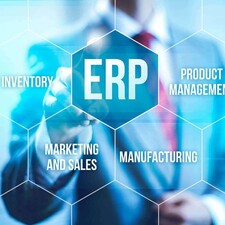Blog
What Type of ERP Solution is Best for Your Business?

Summary
Choosing how to deploy your ERP solution isn’t always cut and dry. While the hot trend for many companies is to consider a cloud solution, that might not be the best choice for every business. An on-premise solution might turn out to be more cost effective. Perhaps a hosted ERP solution is the best way to go. Ultimately, there are pros and cons to all of them. But in the end, it all depends on what the business is trying to achieve.
Pros and Cons of Cloud ERP
Let’s take a look at a cloud ERP solution. The migration to the cloud features a wide array of capabilities, as well as tons of flexibility. For many smaller companies, a cloud ERP solution addresses problems with limited IT staff and the need to invest in hardware to build an infrastructure. There are no upgrade or maintenance fees to worry about. You only pay an annual or monthly subscription, and your software kept up to date for you – upgrades and installations happen automatically.
But a full cloud ERP solution isn’t for every business. There are some reasons why a company wouldn’t want to go this route. First, it doesn’t allow full control over software updates or changes. Upgrades are often forced upon a company whether they want them or not, which often means they have to deal with installation issues that come up. In addition, businesses typically have less control over security policies with a cloud solution. They just pay for access to the system, usually working through a multi-year contract.
Learn how to Leverage the Industrial Internet of Things (IIoT) with a Modern ERP system.
Click and Download this Informative Guide

On-Premise ERP Solution
For these reasons above, some manufacturing businesses prefer an on-premise solution. So, what are the benefits of staying on-prem in this day of digital transformation where everyone seems to be jumping to the cloud? It all depends on the needs of the company. With an on-premise ERP solution, you purchase all the infrastructure, servers, security, operating system, etc. You license the ERP software from a vendor. For companies that have already invested in an infrastructure and want to keep it, an on-premise solution is probably the best approach. Maybe they have hardware they’ve invested in just two years ago that’s still enough to support spinning up a virtual machine and having their database installed on it.
In this case, they don’t need to migrate to the cloud. Not yet anyway. Why go to the cloud when you’ve already invested so much? If they already have an IT staff on site, they can manage the hardware. They might already have a server that’s able to accommodate the database. At the same time, they might not need cloud access for any of their users. Some businesses have owned their own solution from day one and want to keep it that way.

Cloud and on-premise ERP aren't the only options for deploying your enterprise software - there are also hosted and hybrid ERP options to consider.
A Hosted ERP Solution
A hosted solution is a little different. A hosted ERP solution is set up with the server/s at a data center that you access through a Remote Desktop Connection. In this scenario, the business avoids having to have an IT staff in house. Essentially, the company is able to pay the data center to do the management on their behalf.
hosted solutions allow you to keep your licenses while using another network
If your business is using a hosted ERP solution, you might choose to go to a full Software as a Service (SaaS) approach, which means paying on a subscription bases for your software. At that point, you get into what traditionally is referred to as the cloud. If it’s full cloud, the business is paying a subscription per user, per month, and, as we said, not dealing with any of the hardware, nor are they needing to find a data center.
Hybrid ERP Solution
Keep in mind that there are also hybrid ERP options that use elements of both cloud and on-premise ERP to create the right mix for your business. This is not only about where the servers are physically located -- the flexibility hybrid solutions offer is centered around providing expanded access for your users while still maintaining some on-premise infrastructure. For example, you could maintain your own servers, but pay hosting fees to allow ERP access from web browsers on any devices or subscribe to mobile apps that function outside the ERP in a disconnected state. This hybrid approach applies to both the server being onsite at your facility or an off-premise server hosted at a data center
What combination of on-premise ERP, hosted, and cloud can you do? What hybrid ERP scenarios work best for your company?
Answering this question is what abas does so well. We give our customers the flexibility to adapt their solution as needed. With us, there is no one-size-fits-all solution when it comes to ERP. We’re flexible enough to accommodate many types of solutions.
At abas, we’re a future-ready company. Sure, many of our customers are trending towards a cloud ERP solution, but we also serve customers that are choosing an on-premise, hosted solution, or hybrid ERP solution. For all our customers, it’s the flexibility of our capabilities that matter most.
Ready to start looking for your next ERP? Click to download this valuable guide:
7 Easy Steps to Selecting an ERP System



